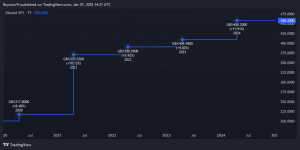BT’s (LSE: BT.A) share price is up 50% from its 13 February 12-month traded low of £1.01.
This might deter some would-be investors on the basis that there cannot be much room for further gains. Others may believe that such momentum means additional price rises must come.
In my 35 years as a private investor, I have found ascertaining a stock’s value is the best approach in this scenario. This is not the same as its price, and the difference is crucial to generating long-term investment profits.
How does the stock look in value terms?
My first step in working out value is to get a feel of how a stock’s price compares to similar stocks.
I use various relative valuation measures to do this, including the price-to-book (P/B) ratio. On this, BT currently trades at 1.2 against an average 1.5 for its competitors. So, it is undervalued on this basis.
The same is true of its price-to-sales (P/S) ratio of 0.8 compared to its competitors’ average of 1.2.
Having satisfied myself that a stock is undervalued on some of my trusted measures, I then look to translate this into a share price that reflects fair value. I do this by running a discounted cash flow analysis using other analysts’ figures and my own.
In BT’s case, this shows the shares to be 62% undervalued at their current price of £1.52. Therefore, a fair value for them is £4. Consequently, any price less than this reflects an undervaluation of the stock to me.
They may trade lower or higher than this, of course. But the DCF’s fair value number underlines the potential major underpricing of BT’s stock suggested by its P/B and P/S ratios.
How does its core business look?
Earnings growth is the key driver of a firm’s share price (and dividend) over the long term, in my experience.
There are risks to this with all firms, of course, and BT is no different. A key one in my view is the high level of investment required to maintain its extensive communications networks. Another is the intense competition in its business sector.
In its H1 2025 results, it lowered its full-year revenue forecast from flat to a fall of 1%-2%. However, it kept earnings guidance unchanged at around £8.2bn, from £8.1bn in 2024. Revenue is the total income generated by a company from sales, while earnings are the profit remaining after all operating costs are subtracted.
Consensus analysts’ estimates are that BT’s earnings will grow 14.1% a year to 2027.
Will I buy the shares?
I already have a holding in the telecoms giant bought at a much lower price and I am happy with that. If I did not already have this, I would consider the shares now for the firm’s strong earnings growth prospects.
This is likely to drive the share price much higher, in my view. I also think it will do the same with the dividend.
As it stands, the firm paid 8p a share last year, which currently yields 5%. By contrast, the average FTSE 100 yield is 3.6%. Analysts forecast that BT’s yield will rise to 5.1% in its fiscal year 2026 and to 5.2% in its fiscal year 2027.
This post was originally published on Motley Fool







